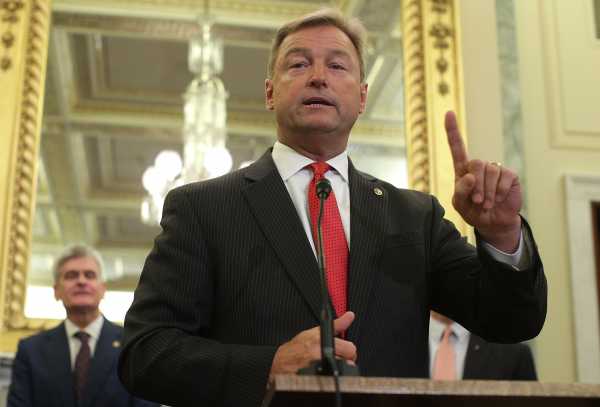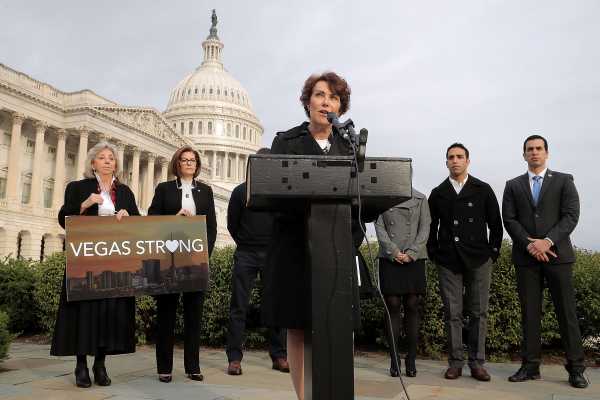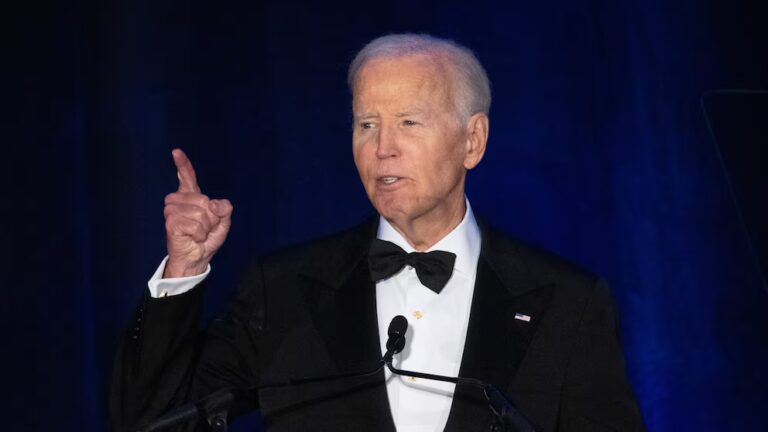
There’s no way around it: If Democrats want to cut into the Republican Senate majority in 2018, they need to defeat Nevada Sen. Dean Heller.
He’s the only Republican senator up for reelection in a state Hillary Clinton won in 2016. He has a 2-point net approval rating, and President Donald Trump is underwater in the state. Nevada Democrats also have one big advantage: They have about 60,000 more registered voters in the state than Republicans do.
Nevada voters will go to the polls on Tuesday for the state’s primary elections, setting up who will face off in November. In spite of some very public needling from Trump over the Obamacare repeal bill last year, Heller got Trump’s support to avoid a serious Republican challenge: Far-right candidate Danny Tarkanian dropped out to run for a different House race instead. Meanwhile, Democrats are rallying around freshman Rep. Jacky Rosen, who beat Tarkanian in 2016.
Already, the polls have shown Rosen and Heller neck and neck in a possible matchup, despite Rosen’s still relatively low name recognition in the state.
Democrats, who are currently just two seats short of a Senate majority, are optimistic they can flip the seat. But in a year when they are also defending 10 Senate seats in states that Trump won, the race to unseat Heller is among the few bright spots for Democrats in the 2018 cycle.
Heller “never misses an opportunity to kind of shoot himself in the foot,” one Democratic Senate campaign aide told Vox. “He seems to take every development that has come up this cycle and find a way to flip it around to inflict the maximum damage to his reelection prospects.”
Dean Heller dodged a potentially thorny primary and made himself scarce
Heller has become known in Washington for being hard to pin down. He’s touted himself as a “no labels” politician and has been tied both to the Tea Party and the moderate faction of the Senate. The tall, often-grinning Nevada Republican has mastered the art of avoiding the spotlight, known among reporters as the senator who knows how to exit the Capitol building without being spotted.
A former House member, Heller was appointed to the Senate in 2011 to replace Sen. John Ensign, a Republican, who resigned amid an ethics and corruption scandal. Heller won a reelection bid in 2012, narrowly beating his Democratic challenger — former lawmaker Shelley Berkley, who had been dogged by ethics scandals in the final weeks of the election — by 1 point.
When Heller does surface, he’s seated next to Trump at White House events — a friendship the Nevada Republican has worked to cultivate despite opposing Trump’s candidacy in the 2016 presidential election. Cozying up to Trump has had some benefits for Heller; Trump tweeted that Tarkanian, who would have been a formidable primary challenger against Heller, should drop out of the Senate race and instead run for the House. Tarkanian, a familiar right-wing name in Nevada politics, obliged.
But the whole episode left a lasting mark on the Senate race, pushing Heller to the right and playing more to the Republican base than toward a more moderate general electorate.

Heller’s voting record in the past year wouldn’t give you any indication that he’s running for reelection in an increasingly Democratic state. He’s voted with Trump almost 92 percent of the time. After announcing that he would oppose any Republican effort to repeal and replace Obamacare in June 2017, Heller went on co-sponsor an Obamacare repeal-and-replace bill with Sens. Lindsey Graham (SC) and Bill Cassidy (LA) that would have cut Nevada’s federal health care funding by $257 million. He voted for the GOP tax bill, which repealed the individual mandate and is expected to raise premiums in Nevada.
“Heller did some real damage on the health care stuff,” David Damore, a political scientist with the University of Nevada Las Vegas, said. “He didn’t make anyone happy.”
In the Senate’s immigration fight, he voted in favor of defunding “sanctuary cities” and the White House’s immigration bill, which would create a path to citizenship for 1.8 million young undocumented immigrants but would have substantially cut legal immigration. He voted against the bipartisan immigration bill despite supporting the infamous Gang of Eight bill in 2013.
But Heller knows he’s a vulnerable candidate in 2018. On some issues, he has been trying to toe a moderate line. For example, he came out this week with a bipartisan bill against Trump’s tariffs on solar panels. Energy, alongside health care, is among the biggest issue issues in Nevada.
Heller told Trump not to shut down the government when spending runs out in September, worried it could play out negatively for Republicans in the midterm elections, Politico reported. And he said he thinks that if Supreme Court Justice Anthony Kennedy retires, the vacancy on the Supreme Court could spur enough Republican enthusiasm to push Republicans to vote for him.
On that point, he’s right — this race will come down to turnout.
Jacky Rosen is a generic Democrat. This year, that could be an advantage.
Meanwhile, Rosen’s political history is very short. In 2016, as a political newcomer, she narrowly won a House race in Nevada’s Third Congressional District against Tarkanian in her first bid for elected office. Her background is in computer programming and consulting, which she says has trained her to be a problem solver.
Originally a Midwesterner and University of Minnesota graduate, Rosen moved to Nevada after college and has lived in the state since. She’s been endorsed by Emily’s List, which helps elect Democratic women candidates who support abortion rights, and NARAL. And she has the Democratic establishment behind her.
“She is literally the generic Democrat,” Damore said, noting that her record in office is almost too short to pick apart.
Her positions are pretty straightforward: She is campaigning on the environment and protecting Medicaid, and is against the Republican tax bill, calling it a “giveaway to special interests and the wealthy” — a position Heller has attacked her for, saying she’s campaigning against “middle-class tax cuts.”
She’s pro-abortion rights and says she’ll push for “commonsense gun safety measures,” like expanding background checks and banning the sale of military-style assault weapons. On immigration, she supports the DREAM Act and co-sponsored a bipartisan bill with Texas Republican Rep. Will Hurd that would give DREAMers a path to citizenship and fund border security.
In a state with quickly shifting demographics, Rosen targeted Latino voters early as part of a six-figure digital ad buy, releasing ads in both English and Spanish highlighting her support for DREAMers. While she still has relatively low name recognition, Rosen has both out-fundraised and outspent Heller in recent months. She ended May with $2.6 million cash on hand, whereas Heller had $4.9 million in his war chest, according to the most recent Federal Election Commission filings.
Her campaign knows they’re going up against big Republican donors and that the national GOP is throwing major resources behind Heller in November.
“The reality is that we live in a modern-day campaign finance world,” a campaign aide said. “Even though we have out-raised Heller, we still live in a world where the Koch brothers or any other billionaire or Super PAC could easily dump in $10 million.”

Nevada has been trending bluer and bluer
Nevada was among the few victories for Democrats in the 2016 election. Clinton carried the state, Sen. Catherine Cortez Masto won former Minority Leader Harry Reid’s open seat, and Rosen managed to flip a Republican-held House seat blue.
A lot of that has to do with Reid, whose legacy in Nevada includes beefing up the state’s Democratic Party machinery, which, in addition to union support, will likely need to play a big role in 2018 against Republican donors.
There’s no question about whether the state’s demographics are rapidly changing in Democrats’ favor. For example, while the 2016 presidential election saw an increase in white voter turnout, white voters actually made up a smaller share of the total Nevada electorate.
But most of that change is happening Nevada’s southernmost Clark County, home to Las Vegas, which has seen a sharp increase in immigrants from Central and South America and Asia, as well as California and Midwestern transplants. This region has proven to be enough to get Democrats elected statewide; Cortez Masto won Clark County and lost every other county in the state and still won the state’s Senate seat by 3 points.
Meanwhile, the Republican Party in the state has been pulled much further to the right. This makes it hard to even walk a centrist line with the state’s newer population.
“[Nevada is] a pretty good microcosm of the country,” Damore said. “Republicans are trending toward Trump, and the Democratic Party is more divided than you’ve seen.”
Sourse: vox.com






